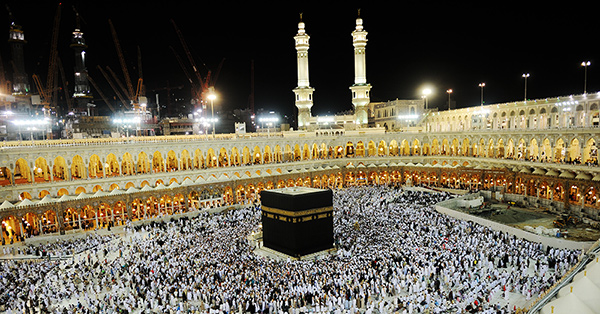
Article by
For millions of Muslims worldwide, the Hajj, or pilgrimage to Mecca, is a spiritual journey that carries great significance. This holy journey, mandated by Allah in the Quran, is one of the five pillars of Islam and must be made by those who can afford it and are physically capable of doing so. Beyond its customs and ceremonies, the Hajj has a deeper significance and represents faith, unity, and introspection for believers.
Historical Context:
The Prophet Ibrahim (Abraham) and his son Prophet Isma'il (Ishmael) were given the order by Allah to build the Kaaba, the hallowed temple of worship in Mecca, which is where the Hajj got its start. The Hajj rites honour the sufferings and offerings made by these esteemed prophets, emphasising various themes.
Allah says in the Holy Quran;
ٱلْحَجُّ أَشْهُرٌۭ مَّعْلُومَـٰتٌۭ ۚ فَمَن فَرَضَ فِيهِنَّ ٱلْحَجَّ فَلَا رَفَثَ وَلَا فُسُوقَ وَلَا جِدَالَ فِى ٱلْحَجِّ ۗ وَمَا تَفْعَلُوا۟ مِنْ خَيْرٍۢ يَعْلَمْهُ ٱللَّهُ ۗ وَتَزَوَّدُوا۟ فَإِنَّ خَيْرَ ٱلزَّادِ ٱلتَّقْوَىٰ ۚ وَٱتَّقُونِ يَـٰٓأُو۟لِى ٱلْأَلْبَـٰبِ ١٩٧
(Commitment to˺ pilgrimage is made in appointed months.1 Whoever commits to ˹performing˺ pilgrimage, let them stay away from intimate relations, foul language, and arguments during pilgrimage. Whatever good you do, Allah ˹fully˺ knows of it. Take ˹necessary˺ provisions ˹for the journey˺—surely the best provision is righteousness. And be mindful of Me, O people of reason!)
Surah Al-Baqarah (2:197)
Spiritual Importance:
Through acts of worship and devotion, travellers on the Hajj can deepen their spiritual connection to Allah. Tawaf, or the seven-time circumambulation of the Kaaba while reciting prayers and supplications, marks the start of the pilgrimage and signifies the believer's recognition of Allah's omnipresence and magnificence. This worship practice reminds pilgrims of their spiritual responsibilities and cultivates humility and reverence.
Unity of Ummah:
The Hajj is a potent symbol of the Ummah (community) of Muslims coming together. Millions of Muslims from all walks of life gather in Mecca to carry out the same rites and prayers, bridging cultural and geographic divides regardless of nationality, ethnicity, or social standing. This shared experience highlights the essential Islamic principle of equality and strengthens the ties of brotherhood and sisterhood among Muslims.
Allah says in the Holy Quran;
وَأَتِمُّوا۟ ٱلْحَجَّ وَٱلْعُمْرَةَ لِلَّهِ ۚ فَإِنْ أُحْصِرْتُمْ فَمَا ٱسْتَيْسَرَ مِنَ ٱلْهَدْىِ ۖ وَلَا تَحْلِقُوا۟ رُءُوسَكُمْ حَتَّىٰ يَبْلُغَ ٱلْهَدْىُ مَحِلَّهُۥ ۚ فَمَن كَانَ مِنكُم مَّرِيضًا أَوْ بِهِۦٓ أَذًۭى مِّن رَّأْسِهِۦ فَفِدْيَةٌۭ مِّن صِيَامٍ أَوْ صَدَقَةٍ أَوْ نُسُكٍۢ ۚ فَإِذَآ أَمِنتُمْ فَمَن تَمَتَّعَ بِٱلْعُمْرَةِ إِلَى ٱلْحَجِّ فَمَا ٱسْتَيْسَرَ مِنَ ٱلْهَدْىِ ۚ فَمَن لَّمْ يَجِدْ فَصِيَامُ ثَلَـٰثَةِ أَيَّامٍۢ فِى ٱلْحَجِّ وَسَبْعَةٍ إِذَا رَجَعْتُمْ ۗ تِلْكَ عَشَرَةٌۭ كَامِلَةٌۭ ۗ ذَٰلِكَ لِمَن لَّمْ يَكُنْ أَهْلُهُۥ حَاضِرِى ٱلْمَسْجِدِ ٱلْحَرَامِ ۚ وَٱتَّقُوا۟ ٱللَّهَ وَٱعْلَمُوٓا۟ أَنَّ ٱللَّهَ شَدِيدُ ٱلْعِقَابِ ١٩٦
(Complete the pilgrimage and minor pilgrimage for Allah.1 But if prevented ˹from proceeding˺, then ˹offer˺ whatever sacrificial animals you can afford. And do not shave your heads until the sacrificial animal reaches its destination. But if any of you is ill or has a scalp ailment ˹requiring shaving˺, then compensate either by fasting, charity, or a sacrificial offering. In times of peace, you may combine the pilgrimage and minor pilgrimage then make the sacrificial offering you can afford. Whoever cannot afford that ˹offering˺, let them fast three days during pilgrimage and seven after returning ˹home˺—completing ten. These offerings are for those who do not live near the Sacred House. And be mindful of Allah, and know that Allah is severe in punishment.)
Surah Al-Baqarah (2:196)
Equality and Humility:
Every pilgrim wears the Ihram during the Hajj; this is a basic garment that represents equality and purity before Allah. The uniform clothing blurs the lines between money and status, highlighting Islam's emphasis on modesty and humility. Walking quickly between the hills of Safa and Marwah, pilgrims conduct the Sa'i, following in the footsteps of Prophet Ibrahim's wife Hajar (also known as Hagar), who went in quest of water for her infant Isma'il. This deed honours Hajar's steadfast faith and endurance, emphasising the need of patience and faith in Allah.
Remembrance of the Hereafter:
Pilgrims get the chance to consider the fleeting nature of life and the final journey to the Hereafter during the Hajj. Gathered on the plains of Arafat, pilgrims offer prayers and expressions of repentance, pleading for pardon for their transgressions and failings. All souls would be held accountable for their deeds on the Day of Judgement, which is symbolised by the group prayers and rites. Pilgrims are encouraged by this contemplation to make a daily effort towards holiness and spiritual purity.
Universal Brotherhood:
Beyond Mecca's boundaries, the Hajj spirit nurtures understanding and compassion for all of humanity. The deed of stoning the devil at Mina represents the victory of faith over temptation and the rejection of evil. In an act of kindness and generosity, pilgrims present sacrificial animals to the less fortunate in order to share the blessings of Eid al-Adha. This altruistic and compassionate attitude promotes social justice and solidarity with the underprivileged, embodying the global ideals of Islam.
The Hajj is a profound spiritual event that embodies Islam; it is much more than just a ceremonial trek. The Hajj encourages faith, unity, and introspection via its customs and traditions, leading believers on a life-changing path of self-realization and spiritual enlightenment. After completing the Hajj, pilgrims return home with a fresh outlook on life and a determination to live according to Islamic principles, pursuing piety and justice in all of their undertakings.

 Monthly "Azeem English Magazine", launched in 2000, records the information about diverse fields like mental health, literature, research, science, and art. The magazine's objective is to impart social, cultural, and literary values to society.
Monthly "Azeem English Magazine", launched in 2000, records the information about diverse fields like mental health, literature, research, science, and art. The magazine's objective is to impart social, cultural, and literary values to society.
+92 51 88 93 092
First Floor, RAS Arcade, Eidhi Market, Street#124, G-13/4, Islamabad, Pakistan, 44000.